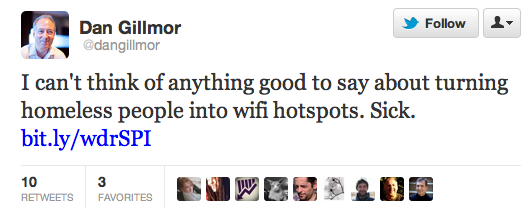And thus too, it happened, perhaps, that before the last echoes of the last chime had utterly sunk into silence, there were many individuals in the crowd who had found leisure to become aware of the presence of a masked figure which had arrested the attention of no single individual before. And the rumour of this new presence having spread itself whisperingly around, there arose at length from the whole company a buzz, or murmur, expressive of disapprobation and surprise—then, finally, of terror, of horror, and of disgust. — Edgar Allan Poe, “The Masque of the Red Death”
I don’t know enough about the realities of Uganda and Africa to make a definitive #StopKony assessment, though I’ll point to pieces by Angelo Opi-Aiya Izama, Chris Blattman, Michael Wilkerson, Mareike Schomerus, Tim Allen, and Koen Vlassenroot. But I have followed the recent history of social media quite closely, and the first few minutes of the KONY 2012 video are so insipid they could have been written by Tom Friedman, or uttered by a certain kind of education conference keynoter: “we share what we love and it reminds us of what we ALL have in common”, “the game has new rules”… Those strike me as the most hackneyed, tired and discredited phrases imaginable, yet they must have power, given the popularity of the video, the millions made by selling “action kits”, the eBay hordes looking for a piece of the action.
And maybe it’s that rhetoric that connects #StopKony in my mind with another of this week’s social media imbroglios, the “human hotspot” hubbub at SXSW — in which homeless people have been employed as by-donation 4G wi-fi transmitters for conference attendees. Unlike the #StopKony affair, there is virtual unanimity in the condemnation of this “charitable experiment”. Dan Gillmor articulates the consensus view: “Nothing good… Sick.”
I am not prepared to offer a condemnation or defense of the stunt, at least until I have answers to a few questions. Such as, how much money are the homeless hotspots making? And what are the opportunities for the homeless in Austin, such as casual day work… and how do they compare? The men who have actually been asked how they feel seem OK with it. I also suspect that if some wireless provider had simply hired attractive eager clipboard kids at minimum wage, or sent unpaid student interns rewarded with a “networking opportunity” at SXSW nobody would object.
So why the vitriol? Bryan Alexander notes the language on the shirts, “I am a homeless hotspot”, which, in a common criticism, frames the participants as “helpless pieces of privilege-extending human infrastructure”. I see the point, but again, there are many humiliating jobs (leaving aside the ‘street papers’ most frequently cited for comparison) at the bottom of the economy in which someone serves as “privilege-extending human infrastructure”. Events like SXSW employ scores of these people directly and indirectly, they could not happen without them, and those jobs do not provide anything like a decent or dignified quality of life.
I have attended a conference in Austin (one of my favorite cities, I hope to go back), and like most North American cities you walk past many homeless people on your way to the conference venues, the networking lunches at the snazzy eateries, the bitchin’ parties in the hospitality suites and clubs. Had this stunt not occurred, I doubt these people would have appeared in the millions of breathless SXSW-related Tweets, Instagrams and blog posts that clog the web this week. If there are more tasteful initiatives at SXSW to help the homeless, I have not heard of them.
So again, why the vitriol? I suspect it is because the organizers of the stunt brought homelessness inside the event. SXSW is entrenched as the preeminent dealmaking opportunity and celebration of web culture, and particularly of start-up culture. SXSW is where dreams come true for internet entrepreneurs and others whose livelihoods involve chasing the next big thing.
Thing is, the dreams associated with startup.com culture are nothing new. Some entrepreneurs and investors have gotten fabulously rich. The boom-and-bust cycles have provided good gigs for a lot of programmers and new media douchebags. But I’ve been around a while, and for every “rock star” I’ve met there’ve been dozens of desperate strivers frantically networking and hoping to convince others that their expertise or vapour-ware service is worth an investment. They haven’t got a prayer, but they repeat the happy social media catechisms all the same (“we share what we love and it reminds us of what we ALL have in common”, “the game has new rules”). And over time, we have seen countless industries “disrupted”, millions thrown out of work, a few big winners and a lot of losers falling through an eroded post-austerity social safety net. The disruption is well underway in education. The game is about as fair and as honest as a Las Vegas casino.
I suspect that many SXSW attendees sense, if unconsciously, how the odds are stacked, how precarious the life of the party is… In Poe’s “The Masque of the Red Death” a plague ravages the land, while a fortunate few favoured by Prince Prospero revel behind protected walls: “There were buffoons, there were improvisatori, there were ballet-dancers, there were musicians, there was Beauty, there was wine. All these and security were within. Without was the ‘Red Death’.” The Prince throws a decadent masquerade, “much of the beautiful, much of the wanton, much of the bizarre, something of the terrible…” Yet one masked partygoer crosses the line, for he has dared to assume the guise of the Red Death itself. The Prince and his guests are outraged. Perhaps when the homeless were brought inside the walls of SXSW, literally decked out in the finery of the digital revolution, something similar was breached.
I started this post quoting Poe, I’ll go back there for the conclusion:
And now was acknowledged the presence of the Red Death. He had come like a thief in the night. And one by one dropped the revellers in the blood-bedewed halls of their revel, and died each in the despairing posture of his fall. And the life of the ebony clock went out with that of the last of the gay. And the flames of the tripods expired. And Darkness and Decay and the Red Death held illimitable dominion over all.


Fear and Exploitation on the Like/Retweet Web | Abject http://t.co/3NGX4asb > Brian you’re bringing out the Goth in me now with all that Poe
Spot on. Great post.
Maybe the outcry is a fear of the reminder that all SXSW networkers have that street-dwellers don’t is weaponisable high-grade bullshit. For all of the “sharing, loving” hipster humanity that oozes from web2.x like the slime from your TV set, very little of it encompasses the painful, dirty and harsh world of the have-nots.
Cheers David, I think I was channeling a little bit of apocalyptic follower energy when I wrote, so am pleased that you approve.
That is a wonderful post by dkernohan — I had not read it.
I feel guilty here following your poetic post with mundane thoughts. But the big lesson here is that change and revolution is cheap. Revolution is the worst type of conformity really, though obviously there are distinctions between child soldiers, Silicon hipsters, and Kony2012 obsessed youth. But revolution is a violent form of belonging that requires a certain blindness and docility. These words we hear at TED or SXSW or Kony2012 plug into us claiming to be ideas, but really the message whispered under all of them is old-time religion — you’re different, you’re chosen, you’re special, you get it. You have what you have because you are better than others. You’re the elite. It is neither emotive or referential in function, but phatic in the purest Jakobsonian sense.
TED presenters are great, but it is interesting to imagine them not presenting on a stage. What if it was just a guy talking to a camera? What would you lose?
You’d lose almost everything. A TED video is not about the presenter — it’s about the audience. I have a vague memory that the videos even used to run with a short pre-reel saying something about how all these brains gather once a year, yadda, yadda, and YOU get to see it.
We share what we love. The game has new rules. You are chosen. Revolution! Maybe it’s Che Guevara. Maybe it’s Ivan Illich.
I’ve got that new Leonard Cohen album, I’m gonna go give it a listen.
I think you’re onto something. The plausible deniability of inequity and injustice evapourates inside the walls of the palace. Rather than acknowledge that, better to do a faux-justice fake out.
The meritocracy is a house of cards. Few are playing with a full deck.
Brian Lamb hits #sxsw : If there are more tasteful initiatives at SXSW to help the homeless, I have not heard of them. http://t.co/f8haOBvw
Few as brilliant as @brlamb, and his post on using homeless as wireless hotspots demonstrates why http://t.co/ry0AEFfL #thatsagoddamnedpost!
I want to go to your church, I know it is a snake wrangling church. I know there are tongues to be spoken in, I know you are channeling some awesome right here and I know I should have more to say but like TOri, the bookends of Poe make this post more like poetry than commentary, which makes it all the more awesome.
“why the vitriol? [..] because [#SXSW] brought homelessness inside the event” @brlamb http://t.co/fFEHhFKt (Via @jimgroom)
Brilliant post, Brian.
I think you’re on to something with the homeless hotspots as defamiliarizing the conference’s – America’s – consciousness of the homeless. However, the hotspot objectification, the dehumanization: that’s the opposite of the way we usually parse the homeless. We prefer to make them abject (ahem), neither subject nor object; abhuman, not dehumanized. Invisible, rather than instrumental. But the way we now think of labor post-2008 fits perfectly: desperate, part-time, contingent, hustling.
Question re: your lovely use of Poe: do you think the whole thing is on the edge, about to collapse?
@Mike I don’t read your comments as mundane in the least. You articulate something I have always struggled to do with regards to the TED scene. I hope you are digging the Cohen record, I gotta give it a listen.
@John – So many great turns of phrase in that short comment… “faux-justice fake out” is my favorite. I’ll try to remember attribution when I rip that one off.
@Jim – The Bava abides…
@Bryan – The reversal you refer to is astute. As for collapse, the past fifteen years have felt like the world’s longest game of Jenga imaginable… I’ve kept seeing pieces falling out, and been expecting the whole thing to fall apart at any moment. It has managed to remain standing for so long (or is that an illusion?)… I feel like I must be missing something essential.
Laughed out loud twice catching up on this post and assorted links from @brlamb http://t.co/jvKc9j0z SXSW and new media douchebags #acerbic
belatedly catching up along with colin. brilliant. attended innovate/activate at berkeley found myself wondering where the kool-aid was stashed cause some of it just did not make sense. alexis tells me that the internet evens the playing field – he compares SOPA to Civil Rights. The economics of the web appears to disenfranchise and perpetuate the same economic structures that turns human beings into wifi hotspots, substitute clicking a button for changing a system. Each click representing dollars into the coffers of not a grassroots group doing work in Uganda but enriching the new breed of mad men.
Righteous rant, Martha!